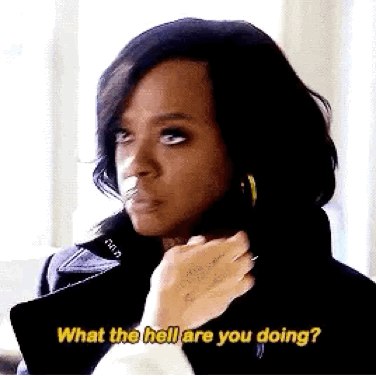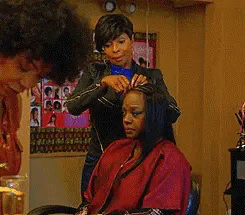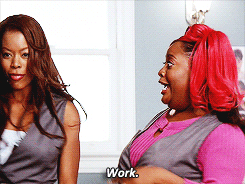A few weeks ago, I found myself relating to a scene in ABC's "How to Get Away With Murder." It wasn't about murder, secrets, lies, prison, or anything you'd expect from this show. It was simply about the act of touching a black woman's hair.
In the scene, a Caucasian woman made the attempt to touch Annalise Keating, a black attorney's hair because it looked nice. Annalise's friend, Tegan Price, attempted to diffuse the situation by moving the woman away. She acted like any good black female friend would because she's experienced the same.
Annalise Keating reacted in a way that I and countless other black women have reacted over many decades. Viola Davis, who plays Annalise Keating, brought it all: the recoil to the touch, the hand-blocking, and the infamous “you must be crazy" look. It was almost as if she had experienced before, and no doubt she probably has experienced all her life as well.

When you touch a black woman's hair, don't be surprised when we pull back and/or smack your hand away from our hair. Don't be surprised if admonish you about it and become upset. Don't be surprised if we no longer wish to be around you or continue working with you for the time being.
In addition, do not continue to make excuses for your behavior after the incident has taken place. The excuses that I've heard over the years do not make the situation better, but sometimes even worse. If you make the mistake of touching our hair, don't make excuses, just apologize.
Here are a few of the most common ones I've heard so many times:
"I just want to admire your hair." You can admire my hair from a distance, there is no reason to touch it.
"You're hair is just so pretty." Yes, I know my hair is pretty. I've spent the time and money to ensure that it is pretty and will remain that way.
"I just can't believe that its real." This is the one that really pushes the limits. It's also the one that I've heard the most. Since I was old enough to remember, people have been obsessed with the idea, that I, as a black girl had long hair.
It's as if it's unbelievable that a black woman can not have long hair naturally.
Even if it is a weave, it doesn't give you the right to make that statement or touch her hair. As we like to say, if she paid for it, it's hers.
If you're saying this to someone, it's a sure sign of a bias and stereotyping that itself is steeped in racism.
The idea of always wanting to touch a black woman's hair is embedded within the acts of institutionalized racism. You don't get the right to touch my hair or become offended that I won't let you touch it. We're not pets, nor zoo animals that are on exhibit for display.
Yes, our hair is often a work of art. If it is a work of art, then let's treat it the same way you treat art pieces in a museum. Remember the signs that read, “Do not touch the art." The same applies to our hair, do not touch it.
At the end of the day, our hair is our hair. It's for our personal enjoyment and the thing that makes us feel good. The act of going to the hair salon is heavily embedded in our heritage and culture. The black hair salon is the place in which black woman go to vent, relax, and get away from the stress of life. They're able to walk away feeling relaxed and looking like a queen.


It's not only the hair salon but also anytime and place at which we care for each other's hair. It doesn't matter if it's the salon or the living room. It doesn't matter if you're rocking a full weave or bald. Hair in our community is something that is connected with comfort and love.
The next time you think about touching a black woman's hair, think about your next steps. Pull your hand back and everything will be okay. If you think my hair looks nice, just say it. Everyone appreciates a good compliment. Just remember not to touch my hair.



















